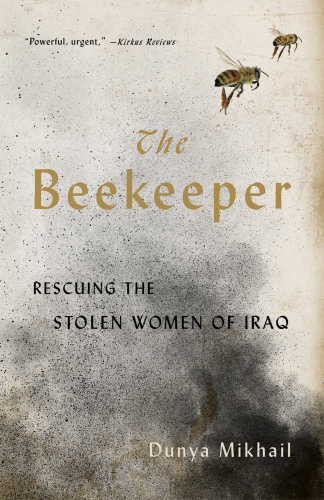
The Beekeeper
Rescuing the Stolen Women of Iraq
- اطلاعات
- نقد و بررسی
- دیدگاه کاربران
نقد و بررسی

January 29, 2018
Iraqi journalist and poet Mikhail
(The Iraqi Nights) lays bare the agonizing experiences of the Yazidi people at the hands of ISIS in this visceral account of the outskirts of modern day Iraq. In 2014, ISIS began invading villages of northern Iraq, killing most of the men and enslaving the women and children. Much of Mikhail’s account is made up of first-person testimonies of several survivors who speak of being repeatedly raped, sold to the highest bidder, and tortured. They recall losing their families and witnessing their children, raised by ISIS supporters, becoming “a distorted version” of who they once were. Mikhail also homes in on the rescue efforts of a man named Abdullah, a local beekeeper who used his knowledge of the region and the money he made selling honey in Iraq and Syria to cultivate a “hive of transporters and smugglers” to save women; he subsequently connected Mikhail to several survivors. Powerful and heartbreaking, this work lets the survivors tell their stories and highlights the courage of those risking their lives to rescue others. Photos.

February 15, 2018
Mikhail, a native of Iraq, returns to her home country from New York to tell the harrowing stories of Yazidi women living under the control of Daesh, known to Westerners as ISIS. A painful, wrenching read, these chronicles expose tremendous horrors of brutal rape, kidnapping, sex slavery, and incomprehensible domination as these women desperately search for some semblance of peace and escape--mental, physical, and emotional. Mikhail's poetic background lends a unique voice to these women in a narrative style that can be difficult to grasp and follow at times. VERDICT These women need to be heard, making this an important, commendable work. However, the atypical narrative format, which switches gears often and includes granular retellings of phone conversations, subjectively affects the reading experience.--Erin Entrada Kelly, Philadelphia
Copyright 2018 Library Journal, LLC Used with permission.

January 15, 2018
An Iraqi journalist and poet long resident in New York returns to her native country to chronicle the misfortunes of Yazidi women under the rule of the Islamic State group.The country of the Yazidi lies outside Mosul in northern Iraq. Under the control of IS, also called Daesh, it saw the rise of two kinds of smugglers: of cigarettes and of captive women. Using tobacco was strictly forbidden under IS, to great penalty, but kidnapping women was a luxury, a prize of war, that was met by Yazidis and sympathetic Arabs smuggling them back to their families, sometimes impregnated by their captors. The beekeeper of Mikhail's (The Theory of Absence, 2014, etc.) title likens the stolen women to queen bees, the work of rescuing the sabaya, or sex slaves, to apiculture: "We worked like in a beehive," he says, "with extreme care and well-planned initiatives." The women are psychologically damaged and do not always reintegrate easily into Yazidi society. Their accounts are harrowing; one tells the author of being raped by a Daesh fighter who sang, "Oh, Muslim, come, there's a virgin in heaven" before assaulting her each night, promising her that in the afterlife she would remain a sex slave to serve the faithful, who "would kill themselves to meet their houris in heaven." Mikhail bears witness to them and other women in war-torn Iraq, women who have scarcely known peace throughout their lives. That she is a poet is clear on each page, as when she writes, "maybe Kurdistan is a daffodil that has only wilted temporarily, only temporarily." She writes affectingly and well, but newsworthy as it is, her account follows two major books--Cathy Otten's With Ash on Their Faces and Nadia Murad's The Last Girl--on the same subject and may be lost in the shuffle. That would be a shame, for it is a meritorious, urgent book that deserves an audience.All but true believers suffer under Daesh, Mikhail makes abundantly clear--but especially women. A powerful study.
COPYRIGHT(2018) Kirkus Reviews, ALL RIGHTS RESERVED.




دیدگاه کاربران